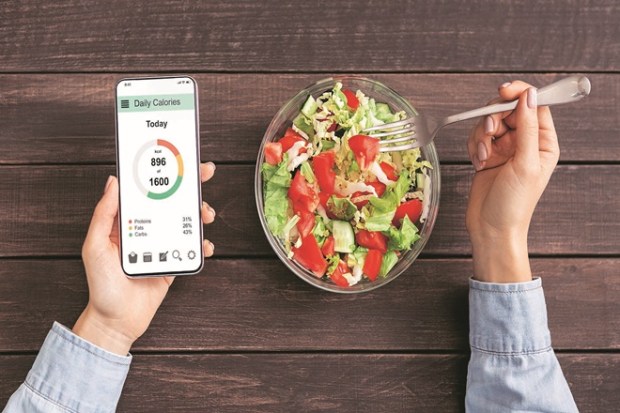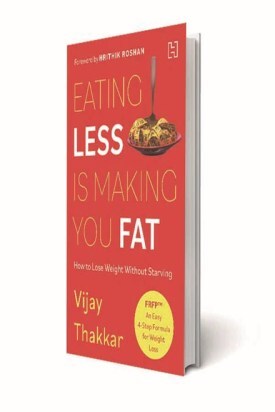Beyond all diets and fasting regimes, which every weight watcher might have tried, and given up, functional medicine expert Vijay Thakkar has some startling advice—eating less is making you fat. It’s also the title of his new book, and tells people ‘how to lose weight without starving’. In an interaction with Ivinder Gill, Thakkar explains why diets don’t work and what actually does to lose weight. Edited excerpts:
Other than debunking myths, what new information are you giving readers?
The new information readers will benefit from is understanding why diets don’t work to sustain fat loss. At this point, it’s critical to make distinctions between weight loss and fat loss. Our body weight comprises fat mass, such as the one underneath our skin, known as subcutaneous fat, and non-fat mass, such as water, bone, muscles, and organs. When we eat less, we lose weight through water, muscle, fat and bone mass loss; thus, weight loss transpires.
Also read: Kick chewing, smoking, and vaping for a healthier you
On the other hand, fat loss means the predominant portion of weight loss is fat mass because the body uses body fat as energy. Thus, more fat exits the body than enters, known as a negative fat balance. With fat loss, you are losing inches, reducing the circumference around the body, such as the waist and hips, and losing overall body mass.

However, for this process to develop and sustain, one needs to give it some time, be patient and continue to maintain this negative fat balance in the long term to continue losing fat, no matter how slowly.
One way a layperson thinks about fat loss is that consuming fewer calories gives quick results because the weight on the scale decreases quickly, and thus one thinks every gram lost is only fat. But nothing can be further from the truth because the initial weight loss is never only fat but predominantly water, which only happens transiently in the initial phase of a low-calorie diet. The dieter experiences short-term weight loss, which is loss of water, some fat and muscles and thus, no significant change in inches indicative of no substantial loss of fat in the body.
Furthermore, eating less can only work as long as motivation is at its peak. As soon as motivation drops over time, which is very natural, our physiology takes over. We start feeling unbearably hungry and deprived of essential nutrients such as protein and fats, leading to overeating to compensate for deprivation, resulting in weight regain. This outcome is a typical response of eating fewer calories over time, leading to a failure to sustain this as a lifestyle.
So, the new information that readers will get from the book is how to lose weight without starving, which makes their dietary pattern sustainable and thus warrants fat loss and not just weight loss.
Everyone knows that balanced eating and regular exercise are the key to fitness, yet obesity is a pandemic. What do you think is the biggest reason—indiscipline, lifestyle or clinical factors?
The two biggest reasons for the rise of obesity are knowledge gap and lack of habit formation. The knowledge gap refers to a lack of understanding of how exercise, food and sleep influence our hormones which regulate our energy levels and fat in the body.
Our muscles and organs become weak when we don’t exercise regularly. Due to this, we cannot burn excess calories, and we operate very efficiently, burning less body fat to survive, also known as an individual possessing frugal or slow metabolism.
Secondly, when we consume processed junk foods, which are nutrient poor, the body only gets calories and not nutrients to burn the calories. Due to this reason, the energy in these foods cannot be sufficiently utilised, and we end up storing more energy as fat, feel hungry and are lethargic. This outcome is also true for lack of sleep. A poor night’s sleep of lesser than 7 hours will cause lethargy and a craving for energy-dense junk food with added fat and sugar. Individuals trying to lose weight sustainably must be aware of all these three fundamental elements and take consistent action to maintain sufficient exercise, nourishment and sleep.
The second significant reason for obesity to rise is a false perception that motivation is essential to exercise regularly and maintain a healthy weight. People are usually waiting for that motivation to come to them and get them started. But the thing is that motivation seldom plays a role in making something a lifestyle. There are no short-term fixes that give long-term results; thus, the most critical ingredient in keeping a healthy weight is taking actions that form small habits carried out daily. These small habits lead to results, which convert to motivation, providing positive feedback in the loop to take more action and craft a clear path of standard operating procedures.

It’s important to note that building healthy habits are seldom about overdoing workouts but rather about doing small things consistently and regularly, like brushing your teeth for healthy teeth. It’s about making healthy living a lifestyle with a 10-20% margin to deviate or indulge. For instance, if you have 30 days a month, achieving 24 days of regular daily activity, which could be a 1-hour workout or 10,000 steps, is an outstanding achievement. Healthy dietary habits for fat loss are never about never having a cake, cookie or your favourite junk food again. As far as a healthy dietary pattern is concerned, consuming minimally processed food most of the time is the way to balance the nutritional teeter-totter. For instance, if you consume 2000 kcal per day to maintain your weight, then at least 80% of calories should come from whole foods directly from farms rather than a factory in the form of processed or packed food. The remaining 20%, 400 kcal, can be budgeted for your favourite daily food if you wish.
So, losing weight is never about going extreme for short-term gains at the cost of long-term loss of adherence. Setting some monthly rules with action plans will be more profound over the long term than setting unrealistic goals. The action plan that gave you compounding annual results is bound to diminish in its magnitude over time, but that should not be perceived as a meaningless pursuit just because the progress may have slowed down over time and is not meeting your expectations. If we focus on the bigger picture because we need to continue fat loss for many decades, then even a 100g loss per month will culminate in 1 kg of fat loss in 10 months. Whereas giving up the plan just because the results have slowed down or are not as fast as they used to be will bring those pounds back, or perhaps more, which would exacerbate the situation. So in 10 months, what would you rather take—1 kg of fat loss or weight regain?
What age group are you targeting with your book, and why?
The age group that would most benefit from the book is all adults in their 30s and above who want to understand why it is so difficult to lose weight and keep it off as we grow older.
Typically, it is during this time that we start to feel that our body is out of our control, and no matter what we do or how much we exercise or eat, it is always challenging to maintain our desired weight.
Though sometimes it’s true, most of the time, the failure to control our body weight is due to lack of knowledge and strategic approach to correct and maintain our optimal metabolic health using scientific tools. Failure to correctly address our metabolic health—which is stress, chronic inflammation, hormonal imbalance, gut problem, nutritional issues, excessive junk food and lack of sleep—is the root cause of weight gain problems.
When we consume food just obsessing about calories, it takes away the focus from the true purpose of eating: nourishing our body. Thus with our conventional thinking and obsession with counting calories, all food and exercise get reduced to only calorie intake and expenditure. We forget the part nutrients and good fitness play in improving our metabolic health, keeping us from gaining excessive weight and overeating.
Shifting fat loss focus from calories to focusing on purposeful physical training to improve fitness and functional eating to give the body nutrient-dense foods is profoundly beneficial. Together they will help reduce the impact of stress on the body, inflammation, repair the gut, and balance hormones in the body, which genuinely addresses the root cause of weight gain.
You allow cheat days, but in balanced eating, isn’t that superfluous and rather self-defeating?
To answer this question, it is first essential to understand that there are three most popular and highly studied and researched approaches toward healthy weight maintenance, which are calorie restriction, dietary restriction and time restriction.
Thus, some form of restriction is necessary to lose weight. The first approach refers to calorie restriction, portion control or calorie counting. The second approach is the dietary restriction, which refers to having hard and fast dietary rules to include and eliminate certain foods to make a ‘healthy diet’. For example, the keto diet eliminates fruits and grains; the paleo diet eliminates processed foods; the vegan diet eliminates animal foods, etc. The third is time restriction, also known as intermittent fasting. The time restriction approach also has various periods for feeding and fasting that a dieter can choose from.
In my experience and supported by the literature, the most challenging diet to adhere to is the dietary restriction method, which is shown to be the least sustainable for weight loss because the diet categorises foods into ‘good’ and ‘bad’ categories. This line of thinking is known as dichotomous thinking, which perceives food as binary. However, in reality, every food renders differing levels of nutritional value. In dietary and behaviour research, the dichotomous perceptions of dieting and food consumption, for example, the idea of ‘clean’ food versus ‘dirty’ food, are implicated as a dysfunctional cognitive style of dietary restriction and lead to binge-eating disorder.
Further, it has been found dichotomous thinking is one of the strongest predictors of weight loss maintenance. When certain foods are eliminated from the diet, they become more appealing to the dieter, and then when dieters are around it in a social situation, it’s never a bite or two because the dieters always promise that this will be the last time they will eat the morally culpable food.
Labelling foods good or bad gives them the underserved power over you, which dictates your behaviour. Building this perception opens up the channel for moral judgment of oneself or others who might consume bad food, thus committing an evil deed and being a flawed human. Foods are typically never good or bad but are only nutrient-rich or nutrient-poor. And as long as we exercise some degree of moderation, junk foods are unlikely to have power over us and will typically not cause such binging episodes. Thus cheat meal is a way to facilitate that control over food to achieve sustainable weight loss without starvation or deprivation. This principle is encompassed in the FRFP tool I have elaborated on in the book.
How big a factor are the variety of processed and packaged foods available, plus easy ordering-in with the likes of Zomato, Swiggy and Blinkit behind rising obesity?
Yes, processed and packaged foods are economical, energy-dense, added with fats and sugars and easily accessible, which undoubtedly contributes to rise in the obesity problem. What adds to the problem is that they are poor in nutrients such as fibre, protein, and healthy fats and rich in fast-digesting, blood sugar-spiking carbs.
While calories are associated with weight gain and loss, they are not causative. What causes us to overeat is the energy-regulating hormones in the body, such as insulin and glucagon. Insulin stores fat, protein and carbs in the body, while glucagon does the opposite: it removes fat, protein and carbs from our stores to give us energy. Fat loss occurs when the ratio of glucagon to insulin is high. However, when the ratio is low, typically with a diet rich in junk food, it results in more fat entering the fat tissue than exiting. As a result, the fat in the body stays trapped when the glucagon-to-insulin ratio is low, leading to a net fat gain and increase in hunger. Over time, both these factors cause overeating because the body cannot access internally stored energy due to the hormonal imbalance of glucagon and insulin. This imbalance, combined with overeating, causes inflammation and diminishing metabolic health.
So, firstly, when we increasingly consume convenience foods, our taste palates shift towards building a dislike for healthy food and a preference for junk food. Secondly, due to the easily digestible nature of junk food, blood sugar rises immediately after consumption, leading to a tremendous insulin spike, followed by a steep drop in blood sugar and a craving for sugar to replenish the levels. Over time, the glucagon to insulin levels remain low due to excessively high insulin levels, and we gain weight quickly.
Food delivery companies have enabled the availability of junk food at the convenience of home rather than going out. So, the growth of the food delivery industry has fuelled the obesity crisis.
If there is one tip you will give all weight watchers, what will it be?
Foods that are healthy for you come from the plant and are not manufactured in a plant. So if you want to be healthy, eat minimally processed foods derived from plants rather than foods manufactured in a plant.








